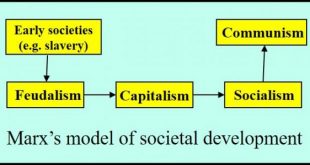A perennial question for Marxists is how to overturn capitalism. Will institutional changes that improve the lot of workers but fall short of ending capitalism immediately help or harm this cause? To the extent that social struggle is a learning-by-doing process, it may be that the securing of small gains can whet the appetite for more significant gains and that institutional reforms of a transformational nature can place revolution on a more secure footing if and when it does occur. But...
Read More »Chris Dillow — In defence of conservative Marxism
This is a very good post by Chris Dillow.He points out that there are two Marxes, so to speak, one radical and the other conservative. The world is most familiar with Marx the radical revolutionary, who advocated violent revolution to remove the "bourgeoisie" (owners of the means of production) and who further proposed a transition stage of "the dictatorship of the proletariat" as being necessary. But Marx is more than the Communist Manifesto, with which he is most associated.The second Marx...
Read More »Thorsten Polleit — Why Marx Loved Central Banks
In his “Manifesto of the Communist Party” (1848), published together with Frederick Engels, Karl Marx calls for “measures” — by which he means “despotic inroads on the rights of property” –, which would be “unavoidable as a means of entirely revolutionising the mode of production,” that is, bringing about socialism-communism. Marx’s measure number five reads: “Centralisation of credit in the hands of the state, by means of a national bank with State capital and an exclusive monopoly.” This...
Read More »Frank Li — What If Karl Marx Was Right, Mostly?
The image below summarizes Marx's works in a nutshell: his societal development model goes through several stages, from some early societies (e.g. slavery) to feudalism, to capitalism, to socialism, and finally to communism. At a very high level, this model is correct. Two "communists", Lenin and Mao, capitalized on this model more than anybody else. Both eventually failed for the same reason: They jumped from feudalism to socialism via a violent revolution that destroyed capitalism,...
Read More »What Is Pure Capitalism?
1.0 Introduction This post is fairly stream of consciousness. It is a bit more about how many find me odd. I have previously mentioned, as an aside, Kozo Uno and his reading of Marx's Capital as a theory of pure capitalism. I like this idea, although it needs to be noted Marx had a lot to say in Volume I about concrete practices in his day and the historical development of capitalism. The theory and history are entwined. But Marx certainly presents the capitalist, not as a person, but as...
Read More »Linear Programming, M-C-M, and C-M
1.0 Introduction Consider typical Linear Programs (LPs) for formulating the theory of firm in classical and neoclassical economics. I claim that the classical theory can be formulated as M-C...P...C-M, and that the neoclassical theory of production is something like C...P...C-M. The notation is from Marx. For Marx, simple commodity circulation is represented as C-M-C. A commodity is sold for money, and then that money is used to buy another commodity. An owner of a use value trades it for...
Read More »Branko Milanovic — Marx for me (and hopefully for others too)
Branko Milanovic explains why Marx's historical analysis of socio-economic phenomena remains not only relevant but also preeminent, based on a few key insights. While he does not identify as a Marxist or even a Marxian, he credits the important influence of Marx on his thinking.There are no non-trivial economic phenomena that are not socio-economic, and Marx is the analyst that put his finger on the how and why. While it would be a mistake to dogmatize Marx, it would also be a great mistake...
Read More »Elsewhere
Matthew Klein writes, in Barron's, about "Tarrifs and the Minimum Wage Are More Alike Than You Think". I disagree with some of the stuff in the middle about efficiency and reject the dualistic notion that government intervention is a meaningful concept. But this article otherwise parallels some of my arguments here. Josh Mason has made available his piece in Jacobin about the state of economics after the global financial catastrophe. The Review of Political Economy has made available...
Read More »Tony Norfield — Finance, Imperialism and Profits
Last Friday I took part in a panel to launch a new book, World in Crisis: A Global Analysis of Marx’s Law of Profitability, published by Haymarket Books, edited by Michael Roberts and Guglielmo Carchedi. The presentation was at this year’s Historical Materialism conference in London. My presentation was on ‘Finance, Imperialism and Profits’, in which I stressed the need to develop Marx’s theory in order to explain the world today. I argued that an accurate measure of a rate of profit (in...
Read More »Robert Paul Wolff — SOCIALISM?
One of the Anonymati [Anonymouses? Anonymice?] asks that I write a critique of the oh so sober, serious analysis of socialism, complete with charts and graphs, produced by the President’s Council of Economic Advisors....I have read the Executive Summary of the report and scanned through the report itself, but I do not intend to take issue with it, and my reason for not doing so is the real subject of this post. Let me begin by reminding you that Karl Marx, who wrote 5000 pages, more or...
Read More » Heterodox
Heterodox

